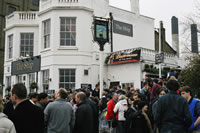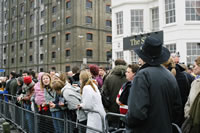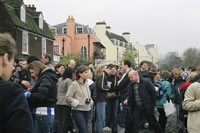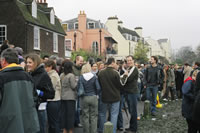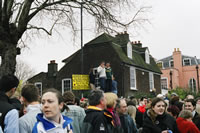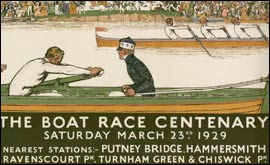But because of overcrowding in the centre of the capital, the universities found a new location between Putney and Mortlake in 1845. Mortlake, supposedly lake of the dead where martyred bodies ... or else where the plague victims of London were buried.
Within 11 years, it became an annual event that has continued through to the 21st century - but for the two World Wars.
Each year, the loser of the previous year's event challenges the winner to a new race.
In the early years of the Boat Race, the crews wore no distinguishing colours.
However, in 1836 Oxford selected dark blue to race in, the colour of their stroke-man's college ( Christ Church ), and Cambridge adopted the "duck egg blue" of Eton
Cambridge are the more successful university, and in 1936 celebrated a record 13th consecutive win.
For their part Oxford won 10 in a row from 1976 and also racked up two nine race streaks - from 1861 to 1869 and again from 1890 to 1898.
But both crews have not always been able to make the finish.
Cambridge sank in 1859, and then suffered the embarrassment of going under water just a mile from the finish in 1978.
Their rivals have endured a similar fate.
Click on any of the images below for an
enlargement.
Oxford sunk in 1925, and in 1951 they lost the rescheduled race after falling foul to rough waters in the initial clash.
Both boats went down in a near gale 1912 - a matter of weeks before the Titanic followed suit.
The most recent sinking occurred in 1984, when Cambridge went down after ramming a barge before they were even under starter's orders.
The remains of the boat now have pride of place in a Cambridge public house.
Almost 6 million viewers tuned into ITV's first Boat Race broadcast in 2005. ITV signed a five-year contract to broadcast The Race from 2005 onwards. The 2005 Race was the 177th anniversary of the first Race in 1829. From 1938 - 2004 the Race was broadcast by the BBC. The BBC first broadcast running commentary in 1927, and 11 years later covered the race on television for the first time. From 1931 until 1980 it was described for radio by John Snagge. Snagge, who died in 1996, uttered his most famous line at the climax of the 1949 Boat Race when the boats were enveloped in fog: "Oxford are ahead. No, Cambridge are ahead. I don't know who's ahead - but it's either Oxford or Cambridge."
LBC 97.3 FM and LBC News 1152 AM were the official radio stations for the 2005 Boat Race. It was the first time since the race was broadcast in 1927 that it was heard exclusively LIVE on commercial Radio & not the BBC. LBC will once again cover the 2006 Race.
The average time taken to complete the course is 20 minutes, but Cambridge holds the record of 16 minutes and 19 seconds, achieved in 1998.
The score as of 2005 stands at 78 to Cambridge , 72 to Oxford , with one controversial dead heat in 1877.
Legend has it that the judge at the finish, “Honest John” Phelps, was asleep under a bush as the crews raced past.
When awakened and asked the result he said: “Dead heat to Oxford by four feet.”
